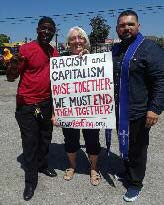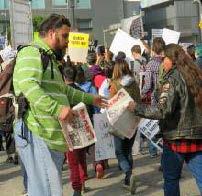Racist Police Murder is a Class Question
We think using the graphic comparing the percent of blacks versus whites killed by the cops was a mistake. It appeared on page 2 of the previous issue. Used in isolation, it undercuts our argument that because racism is a product of capitalism it can only be defeated by communist revolution. Graphics used in this way bolster nationalist or white skin-privilege arguments. They undercut attempts to build revolutionary class consciousness.
About a 1000 people were killed by cops in the USA in 2015. Around 500 were white, 300 black and 180 Hispanic (figures vary a little depending on the organization gathering the info). You never see that bar graph! Imagine it side by side with one that compares the percent of blacks versus whites killed. Then we would have a powerful visual showing how capitalism uses racism. The intense oppression of one sector of our class is used to oppress and discipline the whole working class.
The liberal organizations gather all sorts of statistics differentiating the victims of cop killings: their ethnicity, sex, age, whether they were armed or not and so on. Look in vain for one showing their commonality. Look in vain for a bar graph showing how many victims earned less than $100,000 a year. That would be a powerful statement about the class nature of the murderous police state!
Using graphics is very important. They help us understand things. We could even have used this graphic if we had given it a little thought and changed the commentary that accompanied it. Perhaps it could have read: “Cops kill blacks at a more intense rate than they kill whites, but in actual numbers they kill more whites than blacks: racism is the cutting edge of class oppression.”
—Bay Area Comrades
Puerto Rican Workers Share, Rebuild
Oct. 22—Twenty miles from the city of San Juan, the people of Naranjito have been without clean drinking water and without electricity for over two weeks. They can wait in long lines at a water tank, or use water from a PVC pipe that neighbors connected to a mountain spring. Food prices are double what they were before Hurricane Maria devastated the area.
Yet, the strength and collective spirit of the people is demonstrated in the way they are coming to the aid of friends and neighbors. Those who are able to buy food and cook it, share with those who cannot. Elderly folks with health issues are given what medicines their neighbors and families are able to provide. In the worst of times, they show the very best of humanity.
In our work of creating a model for community based on communist values, we are often asked, “What kind of society will we live in?” And we hear fear expressed, based on repressive socialist regimes that use the name “communist” wrongly. “Those governments kill people!” and, “You would throw us in jail! “
The real truth is in front of our faces DAILY; namely that our so-called free society, democratic government both allows many to die and jails thousands with little to no legal representation.
Looking at the people on the island of Puerto Rico, we must ask ourselves how we would respond to such a disaster, how we could best live alongside our fellow survivors. Yes, how we would want to be remembered by those closest to us in both suffering and in surviving. How we could build a different kind of world, a communist world, out of the devastation.
Join those who want a world where we will care for one another! We have a world to gain!
—Los Angeles (USA) Comrade
NFL Protests: Fight Racism at the Point of Production
While our club was discussing the last editorial, we developed an insight into why the Colin Kaepernick led protests (football players taking the knee during the playing of the National Anthem) were sending such shockwaves through the racist ruling class. We decided it was because they took place on the job! Had Kaerpernick just led or spoken at demonstration it would have annoyed the racist rulers but would not have threatened them so much. But the idea that political protests were being organized at the point of production, at the site where they make their profits, that is a type of protest that scares them.
On the other hand, we thought it was a fact we should take note of. With that in mind we looked again at the conclusion of the editorial and now found it was too general in its declaration of “confidence that the working class, armed with communist ideas, can overthrow this murderous system.” We thought it would be stronger to call on all readers and members to organize meetings, discussions, increase our Red Flag distributions on our jobs and so on – at the point of production. In other words, to call for specific party building to accompany our general confidence.
—Bay Area (USA) Club

Read our Pamphlet:
To End Racism, Mobilize the Masses for Communism
–Available HERE
Talking To A Soldier About Communism
“What will you do with people who do not agree with you? Who will give the masses the weapons and teach them how to use them? Where will the money come from?” They would need a lot of money for it. These were the questions that a soldier friend had in our first talk after a few months of getting to know each other on social networks.
This soldier friend had already read the ICWP military pamphlet and some notes from Red Flag newspaper. After a brief presentation of what the Party is and the past experience with some other soldiers who listen with interest but later cut communication, I answered his questions.
I told him that in it’s time and collectively it will be decided what to do with the people who don’t agree with the political line. There will be a lot of ideological struggle to oppose anti-communist ideas, but there will be people who don’t agree with the line. Maybe they will be put in some place; I didn’t want to call them “jails,” or maybe they will be killed if their ideas are completely counter revolutionary. However, even then, that would have to be discussed first.
He said that in the pamphlet it said that if a person didn’t agree with the political line of the Party, they would be killed, something that he wasn’t willing to do. I told him that he should review the document to confirm that it really said that.
I also told him that we would not have to buy weapons, and we don’t need anyone to finance us. What we need are millions of soldiers, soldiers like him, who have to take up arms against the boss, that is, to build a red army. I told him that’s why I was with him now, showing him the ideas.
I explained that we will never make an alliance with any capitalist power because they are bosses. I talked about the difference between reform and revolution. I said that we want a revolution, since reforms improve capitalism.
It was getting late and he had to go back to work. He took Red Flag newspaper and I told him about the note that talked about the soldiers. He said he would read it. It was agreed that he would write something, but his writing didn’t come on time for this edition.
Sometimes these small discussions seem not to mean much, but they mean a lot; it is to have confidence that we have to find and develop political consciousness among the soldiers and the workers, whether in the barracks or in our workplaces, so that one day we will achieve the liberation of our working class around the world. Join this struggle.
—A young Comrade in Mexico

Questions about Reform Struggles
It appears from articles in Red Flag that ICWP does in some sense support struggles against racist violence even when there’s no immediate prospect of turning those struggles into revolution against capitalism.
Similarly, the party has praised the efforts of the Standing Rock “Water Protectors” to stop a pipeline that would threaten the local water supply. Red Flag correctly describes the choice of location for the pipeline as racist and the protestors as ‘courageous.’ It drew attention favorably to military veterans who came to protect the demonstrators from agents of the state (!). This was really important given the importance of soldiers and sailors in the working-class revolution.
These struggles are reform struggles. How does ICWP understand its relationship to them?
ICWP seems to have focused almost exclusively on defensive struggles – responses to quite particular outrages of capitalism. Is that the line? What about, for example, the old practice in the US during the Vietnam war of trying to abolish officer training (ROTC) on campus? If this were not put forward as a way to ‘purify’ universities but as an attack on US imperialism, would it undermine the case for communist revolution more than supporting the Water Protectors?
There’s a perhaps even more important question. Suppose for example that demonstrations were being planned in my city in support of the Water Protectors and I was going to a meeting. Suppose that I had been tentatively convinced of the Marxist conception of racism but that I wasn’t sure whether in practice one could convince people who were not the direct victims of racism to exhibit class solidarity with its more direct victims.
Should my ICWP friends urge me to work to incorporate that marxist anti-racist position into the literature or speeches for the demonstration even if I was not willing to advocate for communist revolution?
If so, then ICWP might decide which reform struggles to engage with by asking: (1) Will participation provide an opportunity to effectively put forward the party’s line to new people and learn more about how to put it in practice? (2) Will participation help newer friends of ICWP to test out its ideas by taking leadership in putting into practice those aspects of the party’s line with which they tentatively agree? Will it help them grow as leaders?
Perhaps this is not ICWP’s conception of reform struggles. If not, then it would be useful for the party to articulate an alternative.
I’m open to persuasion. But it’s hard for me to see how you could build a mass communist party along a revolution-not-reform platform without inviting newcomers to share in taking initiative in struggles and testing out some of the party’s positions even when they are not yet convinced of the need for communist revolution. How can ICWP help to create such opportunities for its new friends without the party itself being involved in the creation and maintenance of reform organizations?
—Anti-racist reader

LOS ANGELES, Dec. 10, 2016—Marchers in support of the Water Protectors take hundreds of Red Flags
A Comrade Responds to Questions about Reform Struggles
These are good questions that deserve clear answers.
Yes, you’re right, ICWP does take part in what could be called “reform” struggles against racism. The important point is how and why we do this.
We fight racism *as communists * and in order to strengthen the fight for communism. Anything else is in the long run futile, because capitalism will eventually roll back any reform we are able to win.
This is not the way communists in the old movement fought racism. From 1935 through the rest of the twentieth century they fought racism second hand, through non communist ‘front’ organizations. They folded up their red flags, identified themselves as militant (even “marxist”) antiracists, and recruited militant antiracists to join them in fighting for reforms.
The old civil rights movement was a good example – the US Communist Party played an important behind-the-scenes role. And they won big victories against Jim Crow.
So what’s the matter with that? The matter is that there was very little effort to convince the antiracist militants that only communism can end racism or even that communism is a good idea. Now, fifty years later, the US is de facto even more segregated than before, cops murder Black people with complete impunity, and Nazis waving swastikas march openly in the streets.
Another example is the anti apartheid movement in South Africa. Going back to the nineteenth century, communists (including followers of Marx) submerged themselves in the abolitionist movement and left advocating for communism on the back burner.
In all these cases communists ignored the advice of their own manifesto; which says that “in the movement of the present, [communists] also represent and take care of the future of that movement.” The future being communism.
We’re determined to reject the old united front strategy and make the fight for communism an integral part of the fight against racism. A purely militant and even ‘marxist’ fight against racism is, in the long run, futile.
In our view, the absolutely vital takeaway from fighting racism is that *only communism can end racism *
—A comrade


